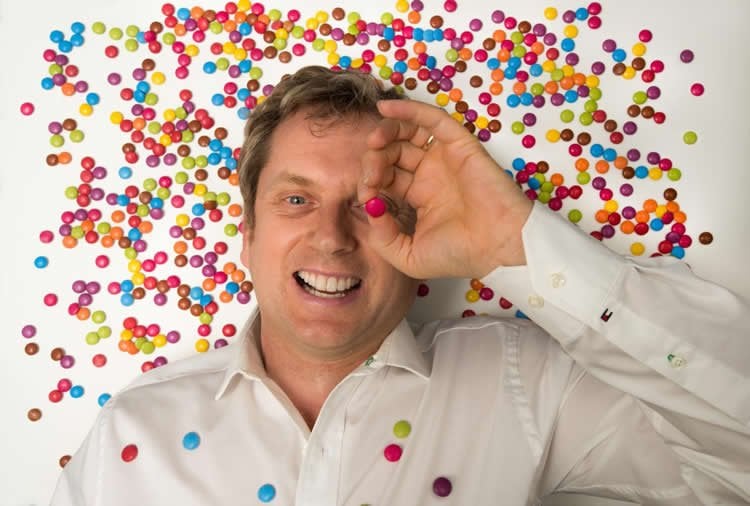Summary: Contrary to popular belief, the color of a popular candy has no impact on happiness over other colors.
Source: Queensland University of Technology.
‘Live the trial’ class debunks the myth.
A test to assess the effect of red Smarties on happiness has been used to teach the often “dull” or “boring” concepts of clinical research.
The study, published in the Asia-Pacific Journal of Public Health, was based on a mock randomised control trial (RCT) across three countries and involved students at QUT and health professionals in Canada and Malaysia.
Health professionals and students who were learning to understand what makes good research and how clinical trials are run became the participants in the study.
They were given a package at the start of the lecture which included a programmed infrared clicker to collect data and a small fun pack of unseen Smarties that were either red or yellow.
Their level of happiness was recorded on a scale of 1-10 at the start and end of the lecture, during which they blindly consumed the chocolate while observed by a fellow participant.
Lead researcher QUT Professor Philip Baker said it was interesting that the results found eating red Smarties had no impact on happiness over the yellow candy-coated chocolate.
“Red is often associated with feelings of happiness and the trial tested this assumption,” Professor Baker said.
“We had hypothesised if the lecture was boring or difficult to understand and it would have resulted in a significant loss in happiness in all groups, however, the happiness data indicated that the participants’ mood remained unchanged.
“This debunks the myth that red Smarties increase happiness and as a result a ‘lived in’ trial can turn a complex epidemiology lecture into an interesting teaching technique.
“It also shows that epidemiology and the study of research methods can be fun and engaging.”

Professor Baker from QUT’s Institute of Health and Biomedical Innovation joined Faculty of Health’s Associate Professor Daniel Francis and QUT Business School Professor Abby Cathcart in the development and design of the trial.
He said the mock trial illustrated the importance of minimising bias and the challenges of conducting quality research using a hands-on and visual approach.
Professor Philip Baker said the aim was to apply and assess an authentic teaching approach to epidemiology and critical appraisal – with learners as participants rather than “just lecturing at students”.
“Students get involved in the clinical trial and thereby learn complex scientific techniques first-hand in a fun way,” Professor Baker said.
Professor Baker received a 2013 Vice-Chancellor’s award for innovations in teaching and Professor Abby Cathcart was last year’s winner of the Vice-Chancellor’s Award for Excellence in Learning and Teaching.
Source: Debra Nowland – Queensland University of Technology
Image Source: NeuroscienceNews.com image is credited to Anthony Weate/QUT Media.
Original Research: Abstract for “A Mock Randomized Controlled Trial With Audience Response Technology for Teaching and Learning Epidemiology” by Philip R. A. Baker, PhD, BSc, Daniel P. Francis, MPH, BAppSc, and Abby Cathcart, PhD, MSc in Asia Pacific Journal of Public Health. Published online April 27 2017 doi:10.1177/1010539517700473
[cbtabs][cbtab title=”MLA”]Queensland University of Technology “Do Red Smarties Really Make You Happier?.” NeuroscienceNews. NeuroscienceNews, 10 May 2017.
<https://neurosciencenews.com/red-smarties-happiness-6631/>.[/cbtab][cbtab title=”APA”]Queensland University of Technology (2017, May 10). Do Red Smarties Really Make You Happier?. NeuroscienceNew. Retrieved May 10, 2017 from https://neurosciencenews.com/red-smarties-happiness-6631/[/cbtab][cbtab title=”Chicago”]Queensland University of Technology “Do Red Smarties Really Make You Happier?.” https://neurosciencenews.com/red-smarties-happiness-6631/ (accessed May 10, 2017).[/cbtab][/cbtabs]
Abstract
A Mock Randomized Controlled Trial With Audience Response Technology for Teaching and Learning Epidemiology
The study’s objective was to apply and assess an active learning approach to epidemiology and critical appraisal. Active learning comprised a mock, randomized controlled trial (RCT) conducted with learners in 3 countries. The mock trial consisted of blindly eating red Smarties candy (intervention) compared to yellow Smarties (control) to determine whether red Smarties increase happiness. Audience response devices were employed with the 3-fold purposes to produce outcome data for analysis of the effects of red Smarties, identify baseline and subsequent changes in participant’s knowledge and confidence in understanding of RCTs, and assess the teaching approach. Of those attending, 82% (117 of 143 learners) participated in the trial component. Participating in the mock trial was a positive experience, and the use of the technology aided learning. The trial produced data that learners analyzed in “real time” during the class. The mock RCT is a fun and engaging approach to teaching RCTs and helping students to develop skills in critical appraisal.
“A Mock Randomized Controlled Trial With Audience Response Technology for Teaching and Learning Epidemiology” by Philip R. A. Baker, PhD, BSc, Daniel P. Francis, MPH, BAppSc, and Abby Cathcart, PhD, MSc in Asia Pacific Journal of Public Health. Published online April 27 2017 doi:10.1177/1010539517700473






